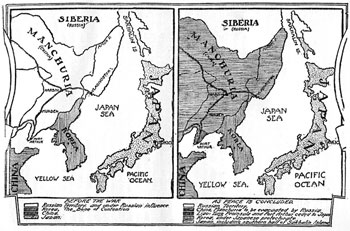
Negotiations, Part 2:
August 10, 11, 12, Thursday, Friday, and Saturday
The formal treaty discussions began on Thursday morning when Komura presented Witte with a list of twelve Japanese demands. It had been understood that since Japan was considered the aggrieved party, they would present demands to Russia. Witte received the written demands from Komura and asked for time to make a response. Witte replied to the demands on Saturday. The Japanese demands follow with a summary of the Russians' response.

Komura presented the Japanese demands to Witte and the Russians. Harper's Weekly. View larger image.

The Japanese issued demands and the Russians responded to them, but did not issue their own demands. Harper's Weekly. View larger image.

Before and After the war maps. View larger image.
Japanese Demands with Russian Response
Demand I - Russia acknowledging that Japan possesses in Korea paramount political, military and economical interests, to engage not to obstruct or interfere with any measures of guidance, protection and control which Japan finds it necessary to take in Korea. Russia agrees to negotiate.
Demand II - Engagement on the part of Russia to completely evacuate Manchuria within a period to be specified and to relinquish all territorial advantages and all preferential and exclusive concessions and franchises in that region in impairment of Chinese sovereignty or inconsistent with the principle of equal opportunity. Russia agrees.
Demand III - Japan to engage to restore to China, subject to the guarantee of reform and improved administration, all those portions of Manchuria which are in her occupation, saving only the regions affected by the lease of the Liaotung Peninsula. Russia agrees to negotiate.
Demand IV - Japan and Russia reciprocally to engage not to obstruct any general measures common to all countries, which China may take for the development of the commerce and industries in Manchuria. Russia agrees.
Demand V - Sakhalin and all islands appertaining thereto and all public works and properties to be ceded to Japan. Russia strongly disagrees.
Demand VI - The lease of Port Arthur, Talien, and adjacent territory and territorial waters together with all rights, privileges, concessions and franchises acquired by Russia from China, in connection with or as a part of such lease and all public works and properties to be transferred and assigned to Japan. Russia agrees to negotiate.
Demand VII - Russia to assign and transfer to Japan free of all claims and encumbrances, the railway between Harbin and Port Arthur and all its branches together with all rights, privileges and properties appertaining thereto, and all coal mines belonging to or worked for the benefit of the railway. Russia agrees to negotiate.
Demand VIII - Russia to retain and work the trans-Manchurian railway, subject to the terms and conditions of the concession under which it was constructed, and subject also to the condition that it is to be employed exclusively for commercial and industrial purposes. Russia agrees to negotiate.
Demand IX - Russia to reimburse to Japan the actual expenses of the war. The amount as well as the time and manner of such reimbursement to be agreed upon. Russia strongly disagrees.
Demand X - All Russian ships-of-war, which, in consequence of damage received in battle, sought asylum in neutral ports and were there interned, to be surrendered to Japan as lawful prizes. Russia strongly disagrees.
Demand XI - Russia to engage to limit her naval strength in the waters of the Extreme East. Russia strongly disagrees.
Demand XII - Russia to grant to Japanese subjects full fishery rights along the coasts and in the bays, harbors, inlets and rivers of her possessions in the Japan, Okhotsk and Bering Seas. Russia agrees to negotiate.
Based on this response, the Russians appeared to agree or to have a basis to negotiate eight of the twelve Japanese terms, but four of the terms were completely refused by Russia. The completely contested terms were:
- Japan wanted to keep all Russian war ships interred in neutral ports (Demand X).
- Russia objected to limitations of her naval force in the Far East (Demand XI).
- Russia refused to pay any of Japan’s costs of war, originally called an indemnity (Demand IX).
- Russia refused to cession of Sakhalin Island, which Japan occupied late in the war after the sides had agreed to peace negotiations (Demand IV).
Roosevelt had suggested to the delegates that they negotiate the demands article by article rather than to take the agreement as a whole. Therefore, from the very beginning of the negotiations, the delegates did not concentrate on the four points of complete disagreement but rather took each term in the order presented by Japan and hammered out a complete agreement before moving to the next term. They skipped those terms on which they could not agree, a crucial decision because it isolated the difficult problems, and as time went on showed how successful the parties were in dealing with the control of Korea and Manchuria, crucial issues over which the war was fought.
By August 12, the Herald reported that souvenir post cards of the first days of the conference were on sale and that the conference had attracted the largest number of summer visitors ever known in Portsmouth. The deliberations also spawned a new beverage, the "Conference Cocktail, a drink the ingredients of which are unknown to all except the man who mixes it. It is said to produce peace by putting those who try it promptly to sleep."

One of the many post cards published during the peace conference.
Portsmouth Athenaeum collection.
